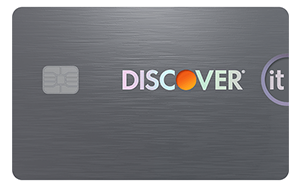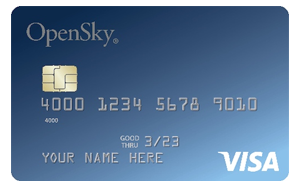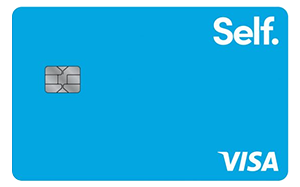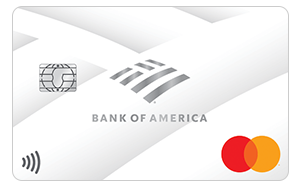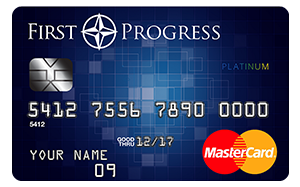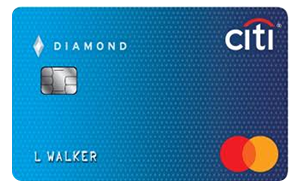The credit scoring system isn’t supposed to take race into account, but minorities are still losing out when it comes to credit ratings. There’s plenty that can and should be done to make credit scores fairer, but in the meantime, there are steps you can (and should) take to improve your own credit and finances.
Table of Contents
How the credit scoring system works
Credit scoring is supposed to be objective. To calculate your credit score, the credit bureaus that provide credit ratings—Equifax, Experian, and TransUnion—collect information from your creditors, which may include student loan providers, mortgage providers, credit card companies, and so on.
The bureaus plug this information into credit scoring models that are provided by two separate companies, VantageScore and FICO. These models then create a numerical score.
Both company’s systems feature a credit score range of 300 points (which is the lowest credit score possible) to 850 points (the highest).
Your credit score is calculated using the following factors:
- Payment history: This consists of your record of on-time or missed payments on your credit accounts and loans.
- Amounts owed and credit utilization rate: This is the total amount of debt you owe and the percentage of your available credit that you’re using.
- Length of credit history: This is based on the ages of all of your credit accounts and loans.
- Credit mix: This represents the variety of the types of credit accounts that you have.
- New credit: This is based on the number of accounts you’ve opened recently and how many credit checks you’ve undergone recently.
While these factors appear objective, they don’t account for structural inequalities in US society, a fact that we’ll dig into more.
How credit scores used to work
Before 1974, the credit scoring system worked differently. Lenders used different criteria, such as whether you had a high-paying job, to decide whether they would give you credit. There also weren’t any laws against lenders considering membership in protected classes (such as sex, race, marital status, national origin, or religion) when making their decisions, and they often relied on personal referrals.
The Equal Credit Opportunity Act of 1974 was supposed to make things fairer. It barred credit scoring systems from taking protected characteristics into account—at least in theory. 1
How the credit scoring system might be working against you
Although the credit scoring system doesn’t explicitly take race into account, it still perpetuates social inequality by reinforcing trends that already exist.
For instance, if you have less wealth and no savings, it’s more likely that you’ll miss payments on your loans and credit cards, which damages your credit score. Having a lower credit score means you’ll have to pay higher interest rates and more fees on future lines of credit, which means you’ll have less money to spare, and so on, in a vicious circle.
The evidence suggests that this disproportionately affects minorities. A survey by Credit Sesame showed that 54% of Black Americans had “poor” or “fair” credit, which was the case for just 37% of white Americans. 2
What can you do to help yourself?
If you’re having credit problems, addressing them can feel like an uphill struggle.
However, there are still measures you can take to:
- Protect your credit from thieves, scammers, and sharks
- Build your credit
- Manage your debts
- Avoid debt traps
How to protect your credit
It’s a good idea to monitor your credit so that if you have any problems, you’ll notice them and can address them as quickly as possible.
You can check your reports safely on AnnualCreditReport.com, a government-sponsored website, or you can do it on the Experian, Equifax, and TransUnion websites. You have the right to get one free credit report a year from each bureau (one per week until the beginning of 2023, due to the COVID-19 pandemic). 3
If you find an incorrect item on your credit report, file a credit dispute immediately. Credit bureaus and creditors are bound by a piece of legislation called the Fair Credit Reporting Act, which means they have a legal obligation to promptly investigate disputes. 4
One study found that 5% of consumers’ credit scores increased by more than 25 points after they fixed an error on their report, so this can be well worth doing. 5
You can dispute inaccurate information by filing a credit dispute letter using the template below.
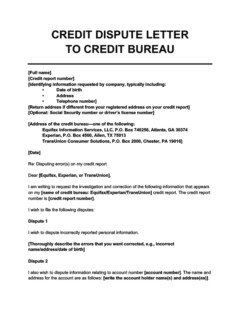
Credit Dispute Letter to a Credit Bureau
Use this credit dispute letter template to file a dispute directly with one of the credit bureaus. Mistakes in your personal information (e.g., an incorrect address), as well as credit accounts that you don't recognize, should usually be disputed with the bureaus. Often they're the result of the bureau confusing you for someone else.
Build your credit
If you have a bad credit score (or no credit score at all), there are methods you can use to improve it.
Take out a credit-builder loan
Some credit unions and banks offer credit-builder loans, which are specifically designed for people with bad credit. Credit-builder loans are also called “reverse loans” because, in contrast to typical loans, you only receive the money after you’ve paid the loan off.
When you take out a credit-builder loan, the lender puts your money (usually between $300 and $1,000) in a special bank account that you can’t access right away. 6 You then make regular payments until the end of the repayment period (often 6–24 months). 6
As you pay the loan down, your lender will report your monthly payments to the credit bureaus so that you can establish a good payment history, boosting your credit score. Once you’ve paid off the full loan amount, you’ll receive the funds.
Get a secured credit card
Secured credit cards are another tool, similar to credit-builder loans, for people whose credit scores are too low for them to get “regular” credit cards.
When you take out a secured credit card, you put down a security deposit, which serves as collateral for the lender (meaning they’ll keep it if you don’t pay your bills). 7 Your credit limit will usually be equivalent to the deposit amount. 8
As with credit builder loans, secured credit cards can improve your credit score because you can build your payment history by paying your bills on time. They’re much easier to get than unsecured cards because they pose less risk to lenders—in many cases, you can get a secured card without undergoing a credit check at all.
| Credit Card | Best For | Credit Score | Annual Fee | Welcome Bonus | |
|---|---|---|---|---|---|
| Secured Overall | 300–669 | $0 | Cashback Match | ||
| No Credit Check | 300–669 | $35 | |||
| Beginners | 300–669 | $25 | |||
| No Annual Fee | 300–669 | $0 | |||
| Bad Credit | 300–669 | $49 | |||
| Rebuilding Credit | 300–669 | $0 | |||
Get credit for paying your bills
One major problem with the current credit scoring system is that certain payments, including utility bills, phone bills, and rent, are generally excluded from credit reports, which means they don’t contribute to your score.
However, there are ways to add these payments to your report. For example, LevelCredit, a third-party service, adds two years’ worth of your previous rent, phone, and utility payments to your credit file for a one-time fee of $49.95.
There’s also Experian Boost, which is a similar service. It doesn’t apply to all of your credit scores (just your score with Experian), but it’s free and lets you get credit for phone bills, utility bills, and even payments for streaming services like Netflix.
Manage your debt
There are strategies you can use to manage your debt and stop it from negatively impacting your credit score.
Enroll in a hardship program
If your bills are stacking up, you can contact your creditor (e.g., your bank or credit card issuer) and ask if they offer hardship programs. Most lenders don’t widely advertise these, but they’re relatively common, especially since COVID left many people struggling financially.
Hardship programs may allow you to:
- Waive certain fees associated with your credit account
- Delay or lower your credit card payments
- Pay less interest or avoid paying it altogether
- Avoid incurring negative marks on your credit reports
- Build a longer-term plan that lets you pay back your debt over an agreed-upon period with lower monthly payments
To find out whether you’re eligible, reach out to your lender proactively.
Even if your lender or creditor doesn’t have a formal hardship program (or if you’re ineligible), you can still try asking outright for lower interest rates. They’ll be more likely to agree if you have a solid history of making consistent on-time payments, so it might be a hard sell if you’ve been struggling for a while. Still, it doesn’t hurt to ask.
Pursue credit counseling
If you’re really struggling, you can receive credit counseling from a nonprofit agency. Setting up an initial consultation has no real downsides—most credit counselors will help you for free or at a relatively low cost, and credit counseling won’t hurt your credit score.
Credit counselors can negotiate with your lenders on your behalf to enroll you in a debt management plan (DMP), which will have similar benefits to a hardship program. Your counselors will also provide you with information and resources to help you make ends meet.
You can find government-approved credit counseling services online.
Consolidate your debts
Debt consolidation is a debt management method that involves taking out a new loan with a low interest rate and using it to pay off your high-interest credit card debt. That way you can lower your monthly payments.
You can also consolidate your debts onto a low-interest credit card; some card issuers offer specialty cards for this purpose. This trick is known as a balance transfer.
Many companies that advertise balance transfer cards will offer you a 0% APR period (your credit card’s APR is its yearly interest rate plus any additional costs and fees) for a few months or years after you open an account. Look for cards with a long 0% introductory period—preferably 15 to 18 months. You can start by reviewing our list of the best 0% APR cards in 2022.
However, watch out for balance transfer fees, which are common. For example, if your new credit card charges a 1% fee for a balance transfer of $4,000, you’ll pay $40 in fees to transfer your existing balances to the new card. Make sure that the fees don’t outweigh the money that you’ll actually save on interest, which would defeat the purpose of the balance transfer.
Negotiate a debt settlement
Debt settlement is an agreement you can make with a creditor or debt collector where you pay off your debt for less than you actually owe. In other words, you fully clear your debt by making only a partial payment.
The benefits of this are obvious, but there are also some downsides to debt settlement—the major one being that lenders don’t have to accept your debt settlement offer, so there’s no guarantee that it will work.
Settled debts also count as negative marks on your credit report and damage your credit score. However, overdue debts are usually even more damaging and can lead to consequences like repossessions, foreclosures, or court judgments against you. If you have severely delinquent debts, debt settlement might be your best option.
Avoid debt traps
A debt trap is exactly what it sounds like—an arrangement where a predatory lender traps you into a high-interest debt that you’ll never be able to pay back.
Payday loans, auto title loans, and other small-dollar loans are all examples of debt traps. These loans are widely available, but they’re almost always a terrible idea.
They charge inflated interest rates and excessive fees, and have even been known to use bad-faith strategies like asking for checks that they know will bounce so that they can threaten you with jail time for sending a fraudulent check. 9 10
Instead of taking out a predatory loan, try getting money from:
- Lending circles: These are formal or informal groups of 6 to 12 people who loan each other money. Everyone makes monthly payments (which, in some formalized programs, are even reported to the credit bureaus), and every month, a different member of the group receives the loan amount (usually with no interest) until everyone has received the same amount. You can try doing an online search for lending circles in your local area.
- Credit union loans: Credit unions are a type of nonprofit financial institution owned by their members. Their loans often have lower interest rates than banks offer. 11 Even if your credit score isn’t good enough for you to get a bank loan, credit union loans may be a different story, as they may look at many other aspects of your finances, not just your credit. However, you usually have to become a credit union member (and pay a small fee) to get a loan from them. 12
- A salary advance: Earned wage access (EWA) tools allow workers to take a portion of their earnings ahead of payday if needed. This kind of solution can help people avoid predatory payday loans or high-interest credit cards. Instead, a worker can request an advance from wages they’ve already earned to help them cover an unexpected expense.
If you’ve already taken out a payday loan, brush up on the ways to get out of payday loan debt. You should pay it off as quickly as possible to avoid getting trapped in a debt spiral.
Watch out for scams if you’ve visited payday loan websites
If you’ve visited a payday loan website, you may be targeted by scammers, especially if you typed any of your personal information into a form on the site. If this applies to you, take care to protect yourself—for example, by checking your bank account and billing statements for unauthorized charges.
Problems with the credit scoring system
We’ve briefly explained some of the problems with the credit scoring system and what you can do to protect your own finances. In the rest of this article, we’ll explain how credit scoring perpetuates inequality in more detail, and offer several potential solutions.
Although the credit scoring companies tout their system as fair, reliable, and impartial, it’s still been widely criticized for many reasons:
It amplifies structural inequality
As we’ve mentioned, credit scoring systems amplify pre-existing structural inequalities. The worse your finances are, the lower your credit score will be, which in turn makes it even harder to recover financially.
Structural inequality makes it harder for members of minority communities to manage their finances in many ways:
- Salary inequity: The salaries of Black Americans are considerably lower than those of white Americans, according to the Bureau of Labor Statistics, which reported that, at the end of 2021, the median monthly salary for white people ($1,030) was 28% higher than median salaries for Black people ($805) or Hispanic people ($799). 13
- Predatory loans: Unethical businesses in the finance industry—particularly payday lenders, who extract billions from low-wage workers—target vulnerable people, amplifying their financial problems and damaging their credit scores. This is particularly likely to be a problem in Black and Hispanic communities, where people are more likely to have lower incomes and lack the savings to pay for large purchases (like vehicles) or major expenses like medical bills.
- Unfair terms on credit: Black people are consistently charged higher interest rates on home and auto loans (even when you control for the amount financed, the term of the loan, and their creditworthiness). Meanwhile, racially discriminatory and subprime auto lending are also on the rise. 14 15
- Racially targeted lawsuits: Lastly, reports indicate that Black borrowers are more likely to be victims of debt collection lawsuits. Lawsuits like these can damage a borrower’s credit and negatively impact their finances. 16 17
The upshot is that minorities generally have a harder time getting credit, and when they do, it has less favorable terms, making it harder to pay back. The major credit scoring models don’t correct for this in any way—in fact, they punish it.
Generational wealth and redlining
Generational wealth bestows significant advantages on those who inherit it, with numerous knock-on effects. For example, those who benefit from generational wealth are more likely to be able to put up a deposit for a home instead of renting, and are less likely to accumulate debts like student loans.
For many Americans, generational wealth comes from inherited property. However, Black Americans have been held back by a history of redlining.
Redlining was a discriminatory practice whereby neighborhoods housing Black people or other minorities were marked in red—hence the name—and deemed high-risk for mortgage lenders.This rendered financial services like mortgages unattainable for people of a certain race or geographic location.
Credit scores are overused
Another problem with credit scores is that they’re used for decisions that have nothing to do with credit.
For instance, individuals with lower credit scores have to pay more for insurance, which can put basic financial protection out of reach. They’re also more likely to be rejected when they apply for housing (there’s no universal credit score needed to rent an apartment, but many landlords do check credit scores).
Credit scores also affect people’s chances of getting jobs, which in Black communities perpetuates the vicious cycle of bad credit and financial problems.
Many people are “credit invisible”
As mentioned earlier in the article, certain data is omitted in the current credit scoring system—in particular, rent, phone bill payments, and utility bills. This omission renders many people “credit invisible.”
Credit invisibility means having no credit history, which excludes you from the current credit scoring system. Approximately 26 million Americans are credit invisible, and according to one CFPB report, credit invisibility is particularly common among Black and Hispanic people and people living in low-income neighborhoods. 18
Credit reporting errors are common
A 2013 study found that credit reporting errors affect 20% of the population. 5 Errors can be simple (for instance, your credit card might be reported as overdue when it’s actually paid off) or extremely broad (your entire credit history might be confused with someone else who shares a similar name).
Credit reporting errors can have far-reaching impacts, affecting the types of credit and interest rates you can get.
Disputing errors on your credit report requires resources
Unsurprisingly, the credit dispute process is highly automated, resulting in numerous lawsuits and federal mandates to improve it. The problem has nonetheless persisted for years because it’s cheaper for credit bureaus to lose the occasional lawsuit than to update or improve their systems.
Although the right to dispute credit reporting errors is enshrined in federal law, in practice, disputing credit report errors still requires certain legal, educational, and sometimes monetary resources. These resources (which include access to attorneys who specialize in credit) are on average more accessible to white Americans than to people of color.
6 policies that could improve the credit scoring system
It’s essential for the federal government to take action to ensure fairer credit reporting and equitable access to favorable terms on loans, credit cards, and insurance.
Below we’ve listed a few of the many policies that could be implemented to improve the financial situations of vulnerable people.
1. Access to information and resources
The government should ensure that information and resources about how to maintain good credit are widely available, especially for people of color, people in low-income areas, and other vulnerable communities. They should also widely disseminate information about predatory lending practices and the potential alternatives.
2. Alternative credit scoring systems
Alternative credit scoring systems already exist that could improve inclusivity (as well as being more efficient).
For example, cash-flow underwriting is an alternative credit-scoring approach that produces ratings based on how much money someone has in their bank account each day over the year. It has been shown to predict people’s creditworthiness more effectively than FICO scores do. 19
3. More consumer control over credit scores
One of the biggest problems with the current credit scoring system is its lack of transparency. The sheer number of credit scoring systems, for example, leaves consumers baffled about how they’re being assessed. Consumers also have little control over who accesses their credit scores, meaning that identity theft is another widespread problem.
Consumers must have better access to and control over their credit reports—for example, the credit bureaus could offer free credit reports any time (instead of just once a year) and give consumers more power over who checks their credit report.
4. Improved dispute processes
As mentioned, the credit dispute process is highly automated and error-prone. Credit bureaus should be made to investigate disputes more thoroughly, devoting adequate resources to doing so, and they should do independent analyses (rather than relying on creditors’ and debt collectors’ records).
Congress should also enable consumers to:
- Appeal in order to contest a creditor or credit bureau’s response to a dispute investigation
- Force a credit bureau to fix a credit report with a court order
5. A publicly-owned credit bureau
In some countries, credit reporting is a public function—or, at least, a publicly owned database exists. Congress should also establish a government-managed credit registry or another publicly-owned alternative to the credit bureaus. This would mean that credit bureaus would be forced to provide a more competitive service with improved accuracy.
6. Support for Black-owned banks
There used to be many Black-owned banks serving predominantly Black communities. However, a recent Urban Institute Report found that these banks declined by more than 50% after 2001—largely disappearing in the early 2010s (probably because of the financial crisis) and being replaced with predatory payday lenders.
Local and state governments should institute policies encouraging the return of Black-owned banks to local communities.
To recap, radical change is necessary to fix the many problems that compromise the integrity of the current credit scoring systems, particularly where disadvantaged people are concerned.
However, in the meantime, it’s important to protect yourself. If you’re worried about your own credit score or mounting debts, there are tools and resources out there that can help you.
Takeaways: The odds may not necessarily be in your favor, but there’s still plenty you can do to improve your credit
- Although the Fair Credit Reporting Act of 1974 was a step in the right direction, the credit reporting system continues to cause problems for many people, particularly minorities and other vulnerable groups.
- The credit scoring system could be improved through measures such as improved access to information and resources, better transparency, more effective dispute processes, and various other measures to improve the accuracy and fairness of existing credit scoring models and processes.
- In the meantime, while errors continue to be a common problem in credit reporting, it’s a good idea to keep an eye on your own report for errors or other problems like identity theft.
- You can improve your credit score directly by getting a credit builder loan or a secured credit card and by signing up for services like Experian Boost that let you report your rent, utility bills, and other payments that wouldn’t usually go on your credit report.
- You can also improve your finances (and therefore your credit score) by using debt management tools and resources like credit counseling or debt consolidation and by avoiding debt traps like auto title loans and payday loans.

